Following the expiration of the Philippines’ travel ban to some 36 countries on January 31, the Philippine Consulate General in Dubai has issued the guidelines to those who are planning to enter the Philippines.
Also Read: 12 Reasons Why Filipinos Want to Work Abroad
As per the Inter-Agency Task Force for the Management of Emerging Infectious Diseases (IATF-EID), foreign travelers are still not allowed to enter the country despite the lifting of the travel ban imposed before the New Year began.
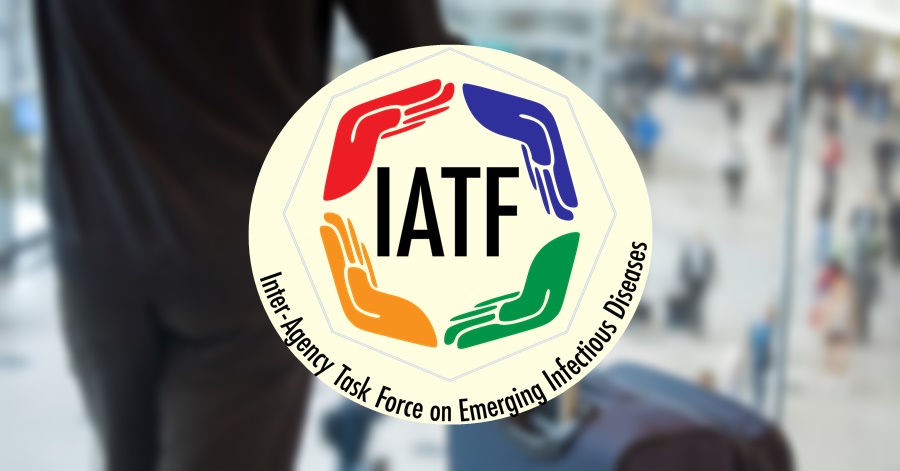
Guidelines for Entering PH After Travel Ban Expiration
In the same announcement, the agency outlined several individual categories who will be allowed to enter the country but are subject to testing and quarantine protocols against coronavirus disease (COVID-19). Among these individuals are:
- Diplomats and members of international organizations and their dependents
- Foreign seafarers provided that they have 9 (c) visa upon entry
- Holders of 13 series visa under the Immigration Act
- Holders of Republic Act No.7919 visas
- Holders of Executive Order 324 visas
- Foreign spouses of Filipino nationals provided that the Filipino spouse is in the Philippines
- Foreign minor children, and foreign children with special needs regardless of the age of Filipino nationals
- Foreign parents of minor Filipino children and of Filipino children with special needs regardless of children
- Holders of special visas issued by Immigration Bureau under Republic Act 8756
- Holders of 47 (a-2) visas issued by the DOJ
- Holders of 9 (d) visas issued by the BI
- Holders of visas issued by economic zones
- Holders of Special Investors Visas
- Dual Filipino citizens carrying foreign passports
- Filipino citizen’s foreign spouses and children regardless of age from non-visa required entries
- Holders of 9 (g) visas who departed from the Philippines on or after December 17, 2020.
With this, everyone indicated in the above list must secure pre-booked accommodation for seven nights in a DOT-accredited quarantine facility. Moreover, they will be required to undergo RT-PCR testing on the sixth day.
Department of Foreign Affairs Advisory: What to do When Travelling to the Philippines
On another note, here’s also an infograph shared by the Department of Foreign Affairs regarding those who are planning to travel to the Philippines. Be advised that these rules may change without prior notice so please always check updates from DFA and your country’s Philippine embassy or Philippine Consulate for the latest updates.
Note: These guidelines are intended for Non-OFWs, Returning Overseas Filipinos, and Foreign Nationals. You may check this link to see if you are allowed to travel to the Philippines – https://www.facebook.com/133424753462907/posts/1932878270184204/
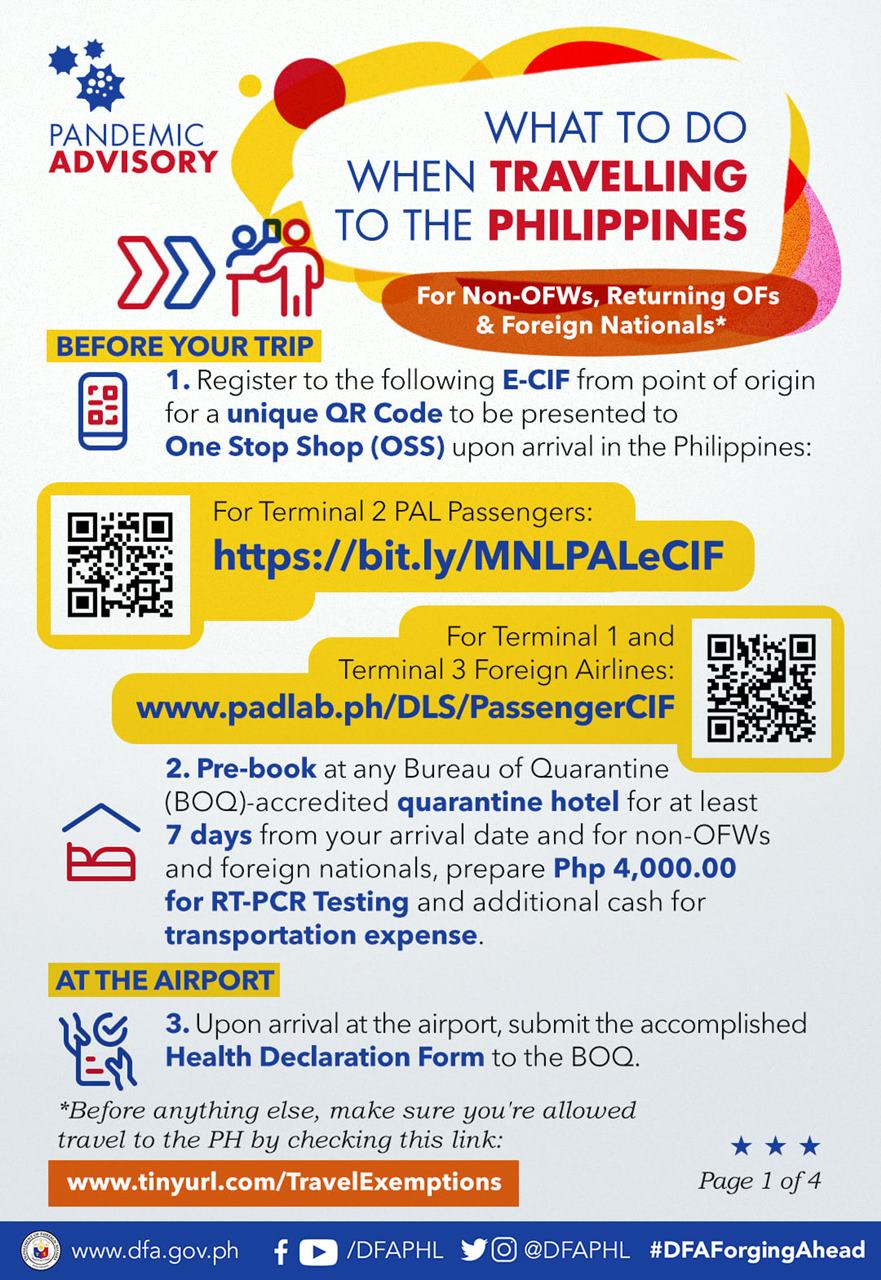
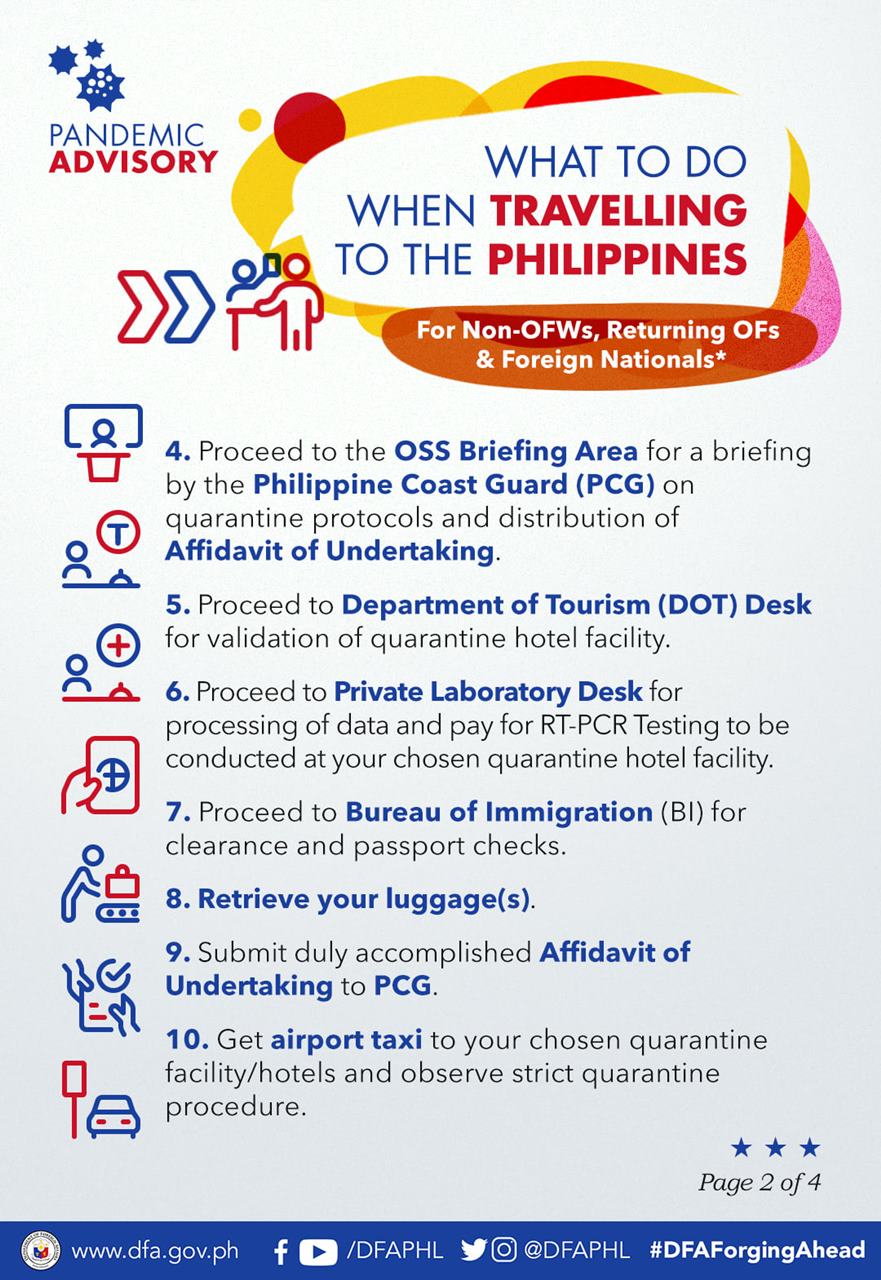
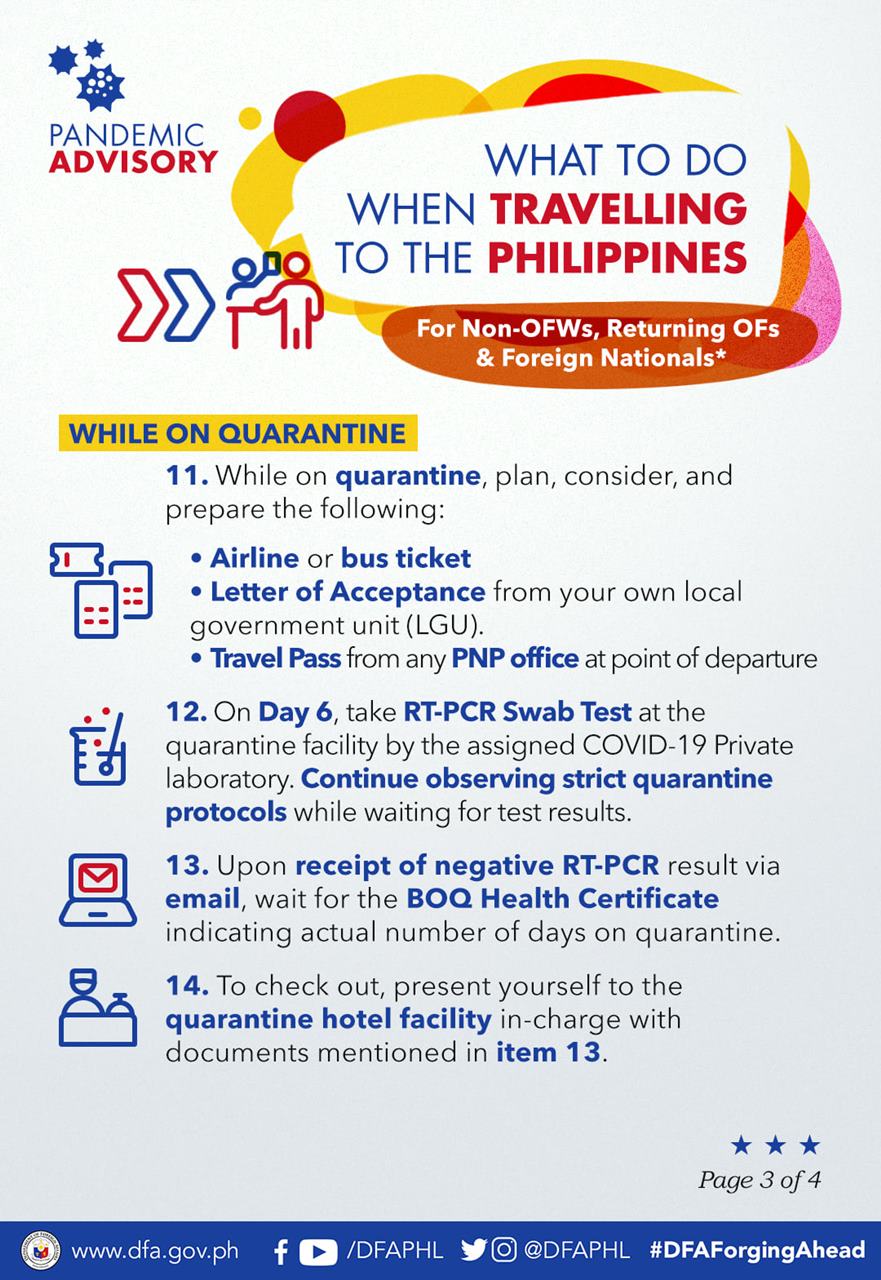
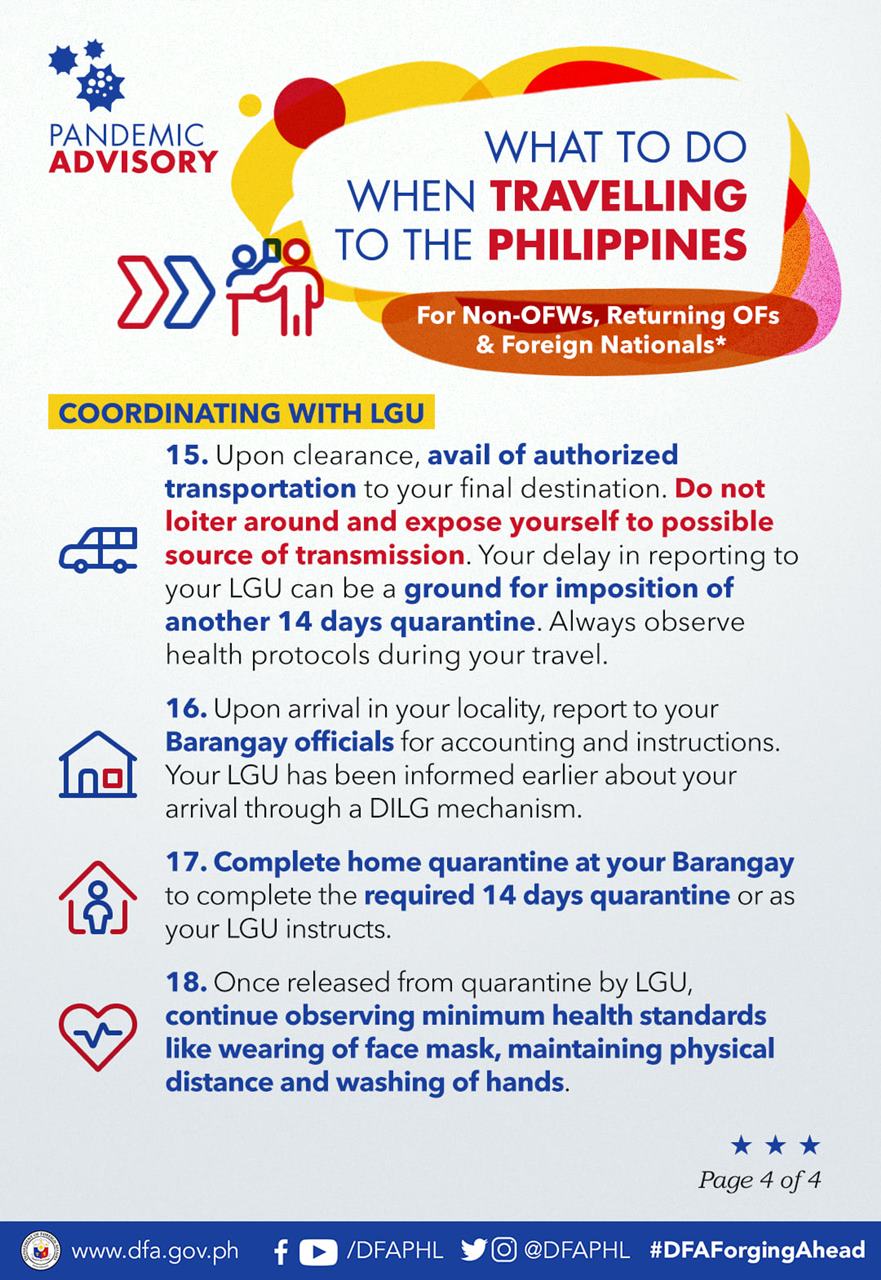
Before Your Trip:
1. Register to the following E-CIF from point of origin for a unique QR code to be presented to One Stop Shop (OSS) upon arrival in the Philippines:
For Terminal 2 PAL Passengers: https://bit.ly/MNLPALeCIF
For Terminal 1 and Terminal 3 Foreign Airlines: www.padlab.ph/DLS/PassengerCIF
2. Pre-book at any Bureau of Quarantine (BOQ)-accredited quarantine hotel for at least 7 days from your arrival date and for non-OFWs and foreign nationals, prepare Php 4,000.00 for RT-PCR Testing and additional cash for transportation expense.
At the Airport:
3. Upon arrival at the airport, submit the accomplished Health Declaration form to the BOQ.
4. Proceed to the OSS Briefing Area for a briefing by the Philippine Coast Guard (PCF) on quarantine protocols and distribution of Addifavit of Undertaking.
5. Proceed to Department of Tourism (DOT) Desk for validation of quarantine hotel facility.
6. Proceed to Private Laboratory Desk for processing of data and pay for RT-PCR Testing to be conducted at your chosen quarantine hotel facility.
7. Proceed to Bureau of Immigration (BI) for clearance and passport checks.
8. Retrieve your luggage (s).
9. Submit duly accomplished Affidavit of Undertaking to PCG.
10. Get airport taxi to your chosen quarantine facility/hotels and observe strict quarantine procedure.
11. While on quarantine, plan, consider, and prepare the following:
– Airline or bus ticket
– Letter of Acceptance from your own local government unit (LGU).
– Travel Pass from any PNP office at point of departure.
12. On Day 6, take RT-PCR Swab Test at the quarantine facility by the assigned COVID-19 Private laboratory. Continue observing strict quarantine protocols while waiting for test results.
13. Upon receipt of negative RT-PCR result via email, wait for the BOQ Health Certificate indicating actual number of days on quarantine.
14. To check out, present yourself to the quarantine hotel facility in-charge with documents mentioned in item 13.
15. Upon clearance, avail of authorized transportation to your final destination. Do not loiter around and expose yourself to possible source of transmission. Your delay in reporting to your LGU can be a ground for imposition of another 14 days quarantine. Always observe health protocols during your travel.
16. Upon arrival in your locality, report to your Barangay officials for accounting and instructions. Your LGU has been informed earlier about your arrival through a DILG mechanism.
17. Complete home quarantine at your Barangay to complete the required 14 days quarantine or as your lGU instructs.
18. Once release from quarantine by LGU, continue observing minimum health standards like wearing of face mask, maintaining physical distance and washing of hands.
READ NEXT: UK Now Requires Foreign Travelers, OFWs Included, to Submit COVID-19 Free Status